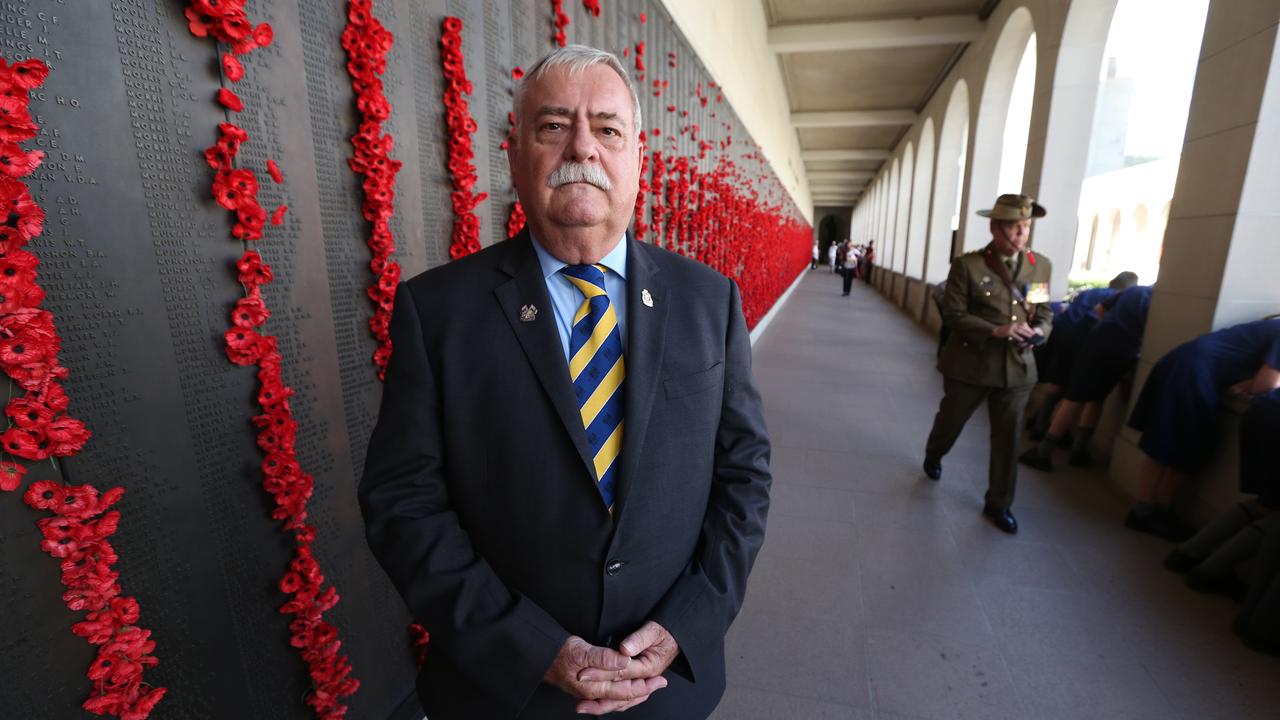An uncommon hero
BRAVE but insubordinate, our greatest soldier was robbed of recognition by the superiors he shamed, reports Natasha Robinson.
BRAVE but insubordinate, our greatest soldier was robbed of recognition by the superiors he shamed, reports Natasha Robinson.
ALBERT Jacka was famous for sticking it up the establishment. But this time he had pushed his impertinence to the limit.
On the eve of the battle of Polygon Wood, the first stage of an offensive to drive the Germans north to the Belgian coast in World War I, the Australian Imperial Force's 14th Battalion was locked in an extraordinary showdown with force command, which wanted to send the famed soldiers back into the field despite recent back-to-back battles during the misery of the Somme.
It was not a mutiny but a display of independence, a microcosm of Australia's burgeoning nationhood. The men of the 14th Battalion had enlisted to fight for the mother country but bucked against the rigid class structure that infected Britain's military order.
Jacka was their champion. His demand was simple, says author Michael Lawriwsky in his historical novel Hard Jacka: The Story of a Gallipoli Legend. His boys needed a rest.
Today, on the 90th anniversary of the Battle of Polygon Wood, a member of Jacka's family maintains that the army captain was punished for speaking out. Had he been awarded the three, or perhaps even four, Victoria Cross medals he deserved instead of one, he would be considered Australia's greatest war hero.
In September 1917, as preparations for the battle of Polygon Wood intensified, Jacka's power struggle with the head of the AIF's 4thBrigade, Charles Brand, deepened. Brand, a brigadier-general and Queensland-born Boer War veteran, had called the 14th Battalion a bunch of dopes, triggering half the unit to resign. Brand apologised to the troops but Jacka refused to back down.
Private Ted Rule listened at the door as Jacka ripped into his superior officer, who had passed Jacka up for promotion in favour of Walter John Smith. In less than two weeks, Smith was to lead the 14th Battalion into battle at Polygon Wood.
Jacka had suggested his unit was being run on the whim of a bunch of heads who had never been anywhere near a trench and wouldn't know one if they'd fallen into it.
Jacka was well qualified to dish out such criticism. Three weeks after his arrival at Courtney's Post, Gallipoli, the former labourer in Victoria's Forestry Department had amazed his commanders by jumping into an enemy-held trench and single-handedly battling a group of armed Turks, killing two with his bayonet and shooting five. It was a stunning act of bravery for which he was awarded Australia's first Victoria Cross of World War I.
The distinction was greeted in his home town, Wedderburn, near Bendigo, with ecstatic celebration.
Fifteen months later, at Pozieres on the Western Front, Jacka led a team of seven men who took on an 80-strong German unit that had captured 40 Australians. Emboldened by their fearless commander, Jacka's team charged at the Germans. Jacka took three bullets, one in the chest. It was a counter-attack that "stands as the most dramatic and effective act of audacity in the history of the AIF", said official war historian Charles Bean.
But instead of the Distinguished Service Order he craved -- an accolade awarded within the military to those destined to rise through the ranks -- the increasingly outspoken Jacka was awarded a Military Cross.
At Bullecourt, in his role as battalion intelligence officer, Jacka ventured alone into no man's land to spy on enemy trenches. His one-man patrols and skill in guiding British tanks into position displayed a brilliant tactical mind and boundless courage.
As Jacka and Brand faced off, Jacka demanded, with characteristic bluntness, to know why promises made to his men had been broken. Jacka's Mob, as the 14th Battalion was known, eavesdropped at the door as Brand said he would have Jacka's hide if he kept it up. Jacka could have been court-martialled for insubordination.
Two weeks later, on September 26, 1917, he led his troops to battle. The plan was for the infantry to advance behind a creeping barrage of artillery shells and pounce on German pillboxes, fortified concrete machinegun posts that had halted the allies' advance north into Belgium.
But as shells rained down, whipping up a storm of mud and debris, disoriented troops, mistaking their own shell attack for a German artillery counter-offensive, began to retreat. Hearing cries to fall back, Jacka seized the initiative and ordered them to follow him.
"The whole brigade were astonished at the bearing of the man," Rule wrote in 1935, reflecting on Jacka's calm command under pressure at Polygon Wood. "He seemed to be here, there and everywhere, with no trace of anxiety or fear. In fact, some men wondered if he possessed a nervous system."
Having driven the troops forward once more, they ran into more trouble. Rockets that were supposed to be fired by the troops at the head of the army's line, the signal for back-up troops to charge, were soggy and would not fire. Without back-up, the men were sitting ducks for German snipers.
Jacka was the only one who knew the exact location of a stash of back-up rockets. They had been carried by his batman, killed as he advanced on a German pillbox.
In broad daylight, Jacka waded through the boggy fields, dodging sniper bullets, copping one in the hand as he retrieved the rockets. Behind him in the field at Polygon Wood, sheltering in shell-hole trenches, Jacka's Mob waited out the German storm troopers' counter-attack. They were waiting for the sign that would come in an explosion of rocket fire.
A half-hour later, the sky lit up and the Lewis guns of the 14th Battalion cranked into life. Twelve men were lost but the tide had begun to turn for the Allies.
Lawriwsky argues that the legend of Jacka has been lost in the nation's history books, buried by politically driven military figures who resented his fierce egalitarianism.
"The most well-known figure of World War I to Australians is probably Simpson (John Simpson Kirkpatrick) and his donkey," Lawriwsky says. "Jacka should have got four Victoria Cross medals. Through every battle, he just kept going. He had this force, a force of character.
"He was super cool. And his men just idolised him because he gave them strength. They see this person who is not afraid. He will face it, come hell or high water. And it gives them strength. They go into battle because he is there."
Lawriwsky draws the same conclusion as Jacka's biographer Ian Grant that a cover-up by force command robbed Jacka of a bar to his Victoria Cross or, alternatively, the DSO.
Brand, basking in victory and deeply impressed with Jacka's command, had sent a runner to the front line at Polygon Wood, Rule wrote. "Congratulations, Jacka," said Brand's note. "I have recommended you for the DSO."
"At Polygon Wood, Jacka achieves his pinnacle as a leader," Lawriwsky says. "He takes command of the battalion in the trenches. And he does it with his normal tactical genius, his resigned bravery and his leadership. He has always wanted to be the lieutenant-colonel running this battalion, but he has always been overlooked, particularly by Brand, because he won't say 'Yes, sir'.
"At Polygon Wood he was holding the whole battalion together. And for that, if he shouldn't have got a bar to his VC, he certainly should have got the DSO."
Nephew Ken Jacka suspects something more sinister. The lieutenant-colonel who was supposed to be leading the 14th Battalion on the field at Polygon Wood, Smith, was nowhere to be seen, and did not surface for three days during the heat of battle.
Ken Jacka believes the conclusions of Grant, who said "recognition of (Albert Jacka's) brilliance was withheld in order to gain as little publicity for the action as possible", are correct.
"I think because the battalion commanders obviously found a nice, safe dugout somewhere and went to ground there, because they were so horrified and ashamed of themselves doing that, they didn't want to draw any attention to the battle of Polygon Wood. I think that's why there were no awards given," Ken Jacka says.
Bean's final assessment strictly toed company force line. "His methods could not have been adopted generally in the AIF without disaster," the historian said.
But for Lawriwsky, Albert Jacka embodies the spirit of Anzac.
"He was against elitism, but not the kind that was earned," Lawriwsky says. "Australians like heroes who perform. They don't respect titles, they respect performance."
Jacka survived the war despite many bullet and shrapnel wounds and being gassed in 1918. He returned home in 1919, eventually became mayor of St Kilda but died in 1932, aged 39.
Though he was championed as a war hero throughout the 1920s and '30s, Jacka has slowly faded from the national consciousness.
At his state funeral in Melbourne, tens of thousands of people lined St Kilda Boulevard as his coffin was carried by eight Victoria Cross veterans.
"He was really killed by the war," Lawriwsky says. "It just took a while to get him, that's all."
Hard Jacka: The Story of a Gallipoli Legend by Michael Lawriwsky is published by Mira Books ($29.95).



